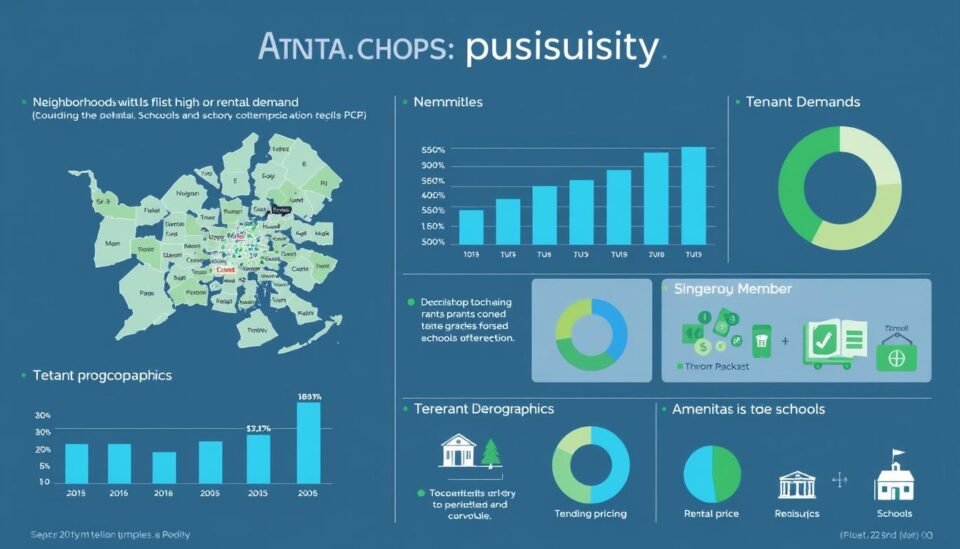Understanding rental demand is key for real estate investors. This guide explores methods for assessing demand in specific areas.
We’ll cover factors, tools, and strategies for success in real estate investment. You’ll learn to make informed decisions and boost your returns.
This guide helps both new and experienced investors. We’ll look at key factors that shape rental demand.
You’ll learn about demographic analysis and price-to-rent ratios. These tools will help you spot promising investment opportunities.
By grasping market dynamics, you’ll make smarter choices. This knowledge will help you meet your investment goals.
Understanding Rental Demand Basics
Rental demand is a key part of the rental market. It involves market basics, supply and demand, and occupancy rates.
Rental demand balances available properties and potential tenants. This balance affects rental prices and vacancy rates.
Occupancy rates show the health of local rental markets. High rates mean strong demand for rentals.
Low rates might indicate too many rentals. These trends guide decisions on buying, pricing, and marketing.
Understanding rental demand helps navigate the market. It aids in making smart choices and finding good investments.
This knowledge helps meet the needs of landlords and tenants. It’s crucial for success in the rental business.
Key Factors Influencing Rental Demand
Rental demand is shaped by several key factors. Demographic trends can greatly impact the need for rental properties.
Population growth and age distribution changes often drive rental demand. People seek flexible living options in areas with rapid demographic shifts.
Economic indicators also play a big role in rental demand. Employment rates and income levels affect where people choose to rent.
Areas with good jobs attract more renters. People want to live close to their workplaces.
Local amenities are crucial in shaping rental demand. Renters look for places near schools, entertainment, and recreation.
Young people especially seek areas with an active lifestyle. Good public transport and infrastructure also influence renters’ choices.
Investors can use these factors to understand rental markets better. This knowledge helps make smart decisions about property investments.
Staying informed about trends ensures long-term success for rental properties. It helps with setting the right rental prices too.
Tools for Analyzing Rental Demand
Data analysis helps uncover rental demand in an area. Many tools and resources can assist with this process.
Real estate platforms offer insights on rental rates and market trends. They help assess rental demand in your target area.
Market analysis software provides detailed data on the competitive landscape. It can help identify potential investment opportunities.
Rental property calculators are useful for a hands-on approach. They consider factors like rental rates and operating expenses.

These tools help you understand rental demand in your area. They can guide your investment decisions effectively.
Both new and experienced investors can benefit from these resources. They reveal the true potential of rental property markets.
Conducting Neighborhood Surveys
On-site property checks and talking to locals can reveal rental demand. This helps you understand the market and make smart investment choices.
Talk to real estate pros, property managers, and neighbors. They can share insights on rental trends and popular features.
Explore the area yourself. Look at rental properties and check for important services nearby.
Note how close schools, buses, and jobs are. These things affect rental demand.
Neighborhood surveys give you a full picture of the local market. This knowledge helps you make better choices about rental investments.
Utilizing Online Resources
The internet offers valuable tools for studying rental demand. Websites like Zillow and Apartments.com show property listings, prices, and market trends.
These platforms help identify popular areas and assess competition. Social media can provide useful qualitative data on tenant preferences.
Real estate forums offer insights from landlords and experts. These discussions cover market conditions and best practices.
Online resources give a full picture of rental demand. They provide data for making smart rental property investment choices.
Making Informed Decisions
Renting can be tough, but you can make smart choices. Good info helps you find great investment chances.
Start by looking at the rental market. Check things like how many units are rented and their prices.
Know your area well. This helps you spot the best rental deals.
Create a strong plan for your investments. You might want to buy different types of rentals.
Pick good locations for your properties. Keep checking and changing your plan as the market shifts.
Think about possible problems, like money issues or new laws. Plan ahead to protect your investment.


